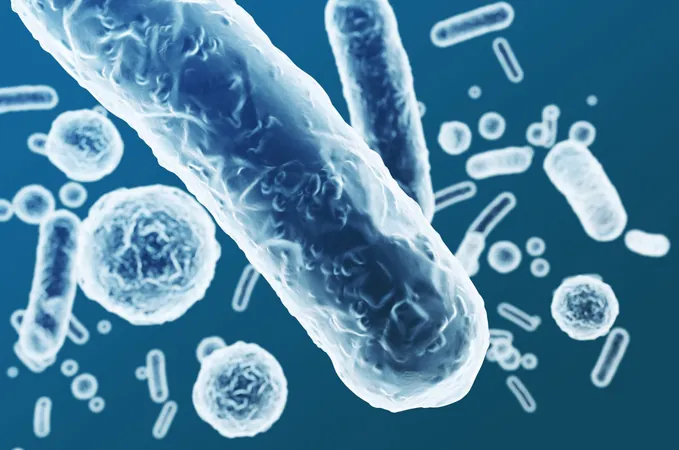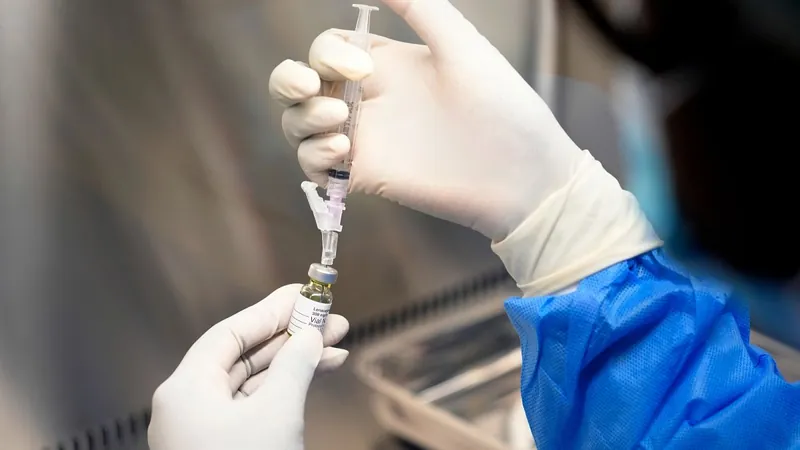
Unlocking the Secrets of Infant Health: The Power of the Microbiome
2025-06-27
Author: Jia
The Microbiome: A Hidden Hero in Infant Health
When we think about ensuring a baby’s health, we often focus on nutrition, vaccinations, and pediatric check-ups. But there’s an unseen force at play that’s just as crucial: the microbiome.
What Exactly Is the Microbiome?
The microbiome is a complex community of trillions of bacteria, viruses, and fungi residing not only in the gut but also on the skin and in various other body areas. These tiny organisms are essential for digesting food, producing vitamins, shielding against harmful pathogens, and training the immune system. At birth, a baby's microbiome is like a blank canvas, shaped by factors such as the type of delivery, environmental influences, and feeding methods.
Rapid Changes: The First Year
The first year of an infant's life is critical for both growth and the development of their microbiome. Right from birth, babies begin to acquire microbes—vaginally born infants inherit beneficial bacteria from their mothers, while those born via cesarean section often start with skin bacteria. By the age of three or four, their gut microbiomes begin to resemble that of adults, but those early microbial foundations can heavily influence future health, including risks for allergies, obesity, and autoimmune disorders.
Breastfeeding: Fueling a Healthy Microbiome
Exclusive breastfeeding for the first six months is the gold standard. It's not just about nutrition; breast milk nurtures the development of a baby’s microbiome and immune system. One key component, human milk oligosaccharides (HMOs), feeds beneficial bacteria like Bifidobacterium, essential for digestion and fighting infection. Breastfed babies typically boast a gut microbiome rich in these protective bacteria, whereas formula-fed babies may harbor more harmful species. Additionally, breast milk is packed with antimicrobials that boost immunity.
The Preterm Challenge: Navigating Unique Microbiome Challenges
Preterm infants face distinct hurdles as they often spend time isolated in NICUs, receive frequent antibiotics, and may miss early exposure to breast milk. This leads to a microbiome that can be more prone to harmful bacteria, increasing risks for serious conditions like necrotizing enterocolitis (NEC). Researchers are actively exploring strategies to enhance the microbiomes of these infants, emphasizing the benefits of maternal breast milk.
Why the Microbiome Is Key to Lifelong Health
The early microbiome plays a crucial role in training the immune system and has been correlated with a host of chronic health issues. A balanced microbiome helps mitigate overreactions to non-harmful substances, reducing the likelihood of allergic diseases. Breastfed infants are statistically less prone to respiratory infections, allergies, obesity, and even autoimmune disorders.
Bridging the Knowledge Gap
Despite significant strides made by researchers at the University of South Florida Microbiomes Institute, many questions remain. What specific bacteria are vital for enduring health? How do components in breast milk combat infections? What are effective strategies for restoring a healthy microbiome?
What’s Next in Microbiome Research?
Exciting advances are on the horizon! Research into next-gen probiotics and the influences of a mother's microbiome during pregnancy could lead to tailored healthcare strategies for infants. As we decode the mysteries of the microbiome, we become more adept at supporting infants’ health today and into the future.
In summary, nurturing the microbiome in early life through breastfeeding and personalized medical care is pivotal for short-term wellbeing and long-term health.




 Brasil (PT)
Brasil (PT)
 Canada (EN)
Canada (EN)
 Chile (ES)
Chile (ES)
 Česko (CS)
Česko (CS)
 대한민국 (KO)
대한민국 (KO)
 España (ES)
España (ES)
 France (FR)
France (FR)
 Hong Kong (EN)
Hong Kong (EN)
 Italia (IT)
Italia (IT)
 日本 (JA)
日本 (JA)
 Magyarország (HU)
Magyarország (HU)
 Norge (NO)
Norge (NO)
 Polska (PL)
Polska (PL)
 Schweiz (DE)
Schweiz (DE)
 Singapore (EN)
Singapore (EN)
 Sverige (SV)
Sverige (SV)
 Suomi (FI)
Suomi (FI)
 Türkiye (TR)
Türkiye (TR)
 الإمارات العربية المتحدة (AR)
الإمارات العربية المتحدة (AR)